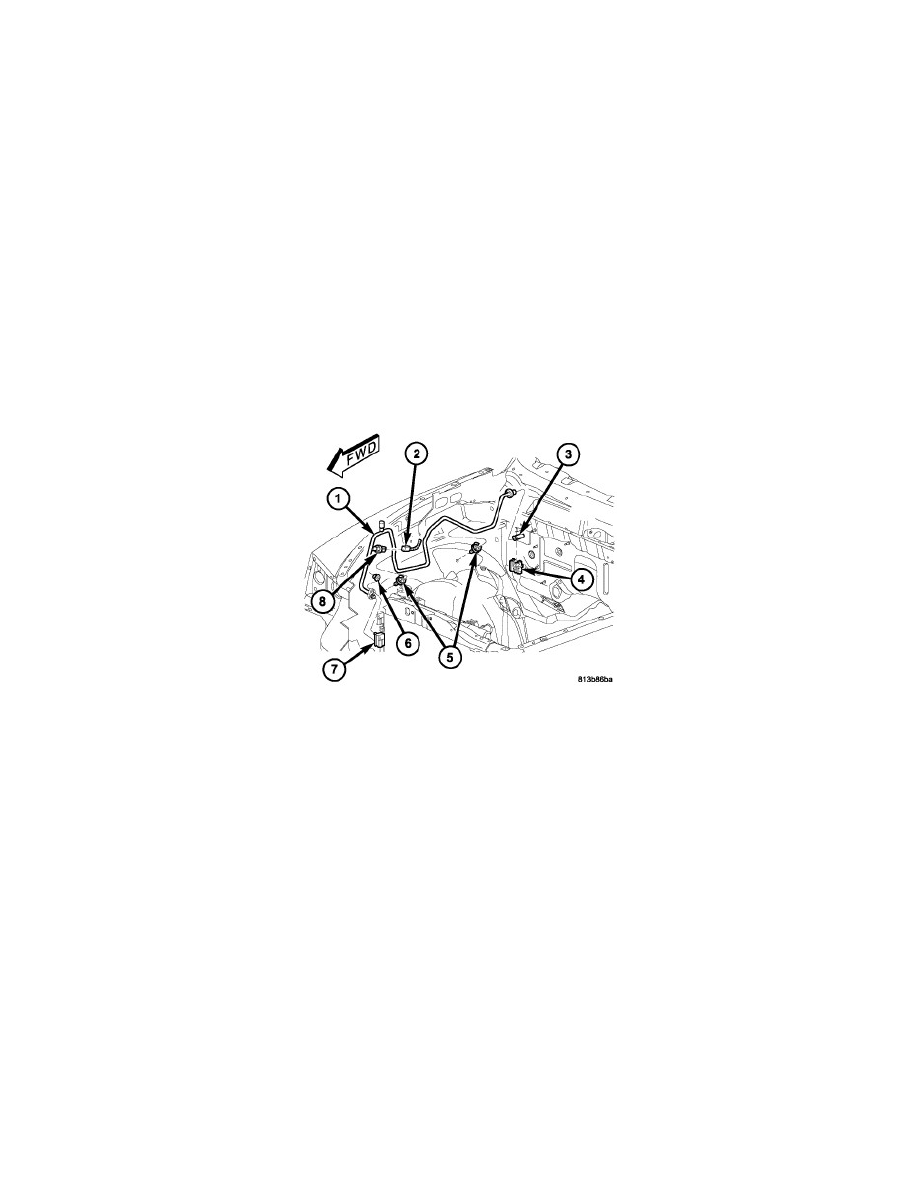Dakota 4WD V8-4.7L (2009)

8. Remove the secondary retaining clip (4) from the spring-lock coupler that secures the A/C liquid line to evaporator inlet tube (3).
9. Using the proper A/C line disconnect tool (Special Tool Kit 7193 or equivalent), disconnect the A/C liquid line from the evaporator inlet tube and
remove and discard the O-ring seals See: Coupler HVAC/Service and Repair/Refrigerant Line Coupler - Removal.
10. Install plugs in, or tape over the opened liquid line fittings and the condenser and evaporator ports.
11. Remove the A/C liquid line from the engine compartment.
12. If required , remove the A/C pressure transducer from the A/C liquid line See: Refrigerant Pressure Sensor / Switch/Service and Repair/A/C
Pressure Transducer - Removal.
A/C Liquid Line - Installation
INSTALLATION
CAUTION: Be certain to adjust the refrigerant oil level when servicing the A/C refrigerant system See: Service and Repair/Refrigerant Oil Level
. Failure to properly adjust the refrigerant oil level will prevent the A/C system from operating as designed and can cause serious
A/C compressor damage.
NOTE: When replacing multiple A/C system components, refer to the Refrigerant Oil Capacities chart to determine how much oil should be
added to the refrigerant systemSee: Service and Repair/Refrigerant Oil Level .
NOTE: Replacement of the refrigerant line O-ring seals and gaskets is required anytime a refrigerant line is disconnected. Failure to replace
the rubber O-ring seals and metal gaskets could result in a refrigerant system leak.
1. If removed, install the A/C pressure transducer (8) onto the A/C liquid line (1).
2. Position the A/C liquid line into the engine compartment.
3. Remove the tape or plugs from the opened liquid line fittings and the condenser and evaporator ports.
4. Lubricate new O-ring seals with clean refrigerant oil and install them onto the liquid line spring-lock coupler fitting. Use only the specified O-ring
seals as they are made of a special material for the R-134a system. Use only refrigerant oil of the type recommended for the A/C compressor in the
vehicle.
5. Connect the A/C liquid line to the evaporator inlet tube (3) See: Coupler HVAC/Service and Repair/Refrigerant Line Coupler - Installation.
6. Install the secondary retaining clip (4) onto the spring-lock coupler that secures the A/C liquid line to the evaporator inlet tube.
7. Engage the A/C liquid line into the body retaining clips (5).
8. Lubricate a new O-ring seal with clean refrigerant oil and install it and a new gasket onto the liquid line fitting. Use only the specified O-ring seal
as it is made of a special material for the R-134a system. Use only refrigerant oil of the type recommended for the A/C compressor in the vehicle.
9. Connect the A/C liquid line to the condenser outlet port (7).
10. Install the nut (6) that secures the A/C liquid line to the condenser outlet port. Tighten the nut to 23 Nm (17 ft. lbs.).
11. Install the air filter housing.
12. Connect the wire harness connector (2) to the A/C pressure transducer.
13. Reconnect the negative battery cable.
14. Evacuate the refrigerant system See: Service and Repair/Refrigerant System Evacuate.
15. Adjust the refrigerant oil level See: Service and Repair/Refrigerant Oil Level.
16. Charge the refrigerant systemSee: Service and Repair/Refrigerant System Charge.
A/C Suction Line - Removal
REMOVAL
WARNING: Refer to the applicable warnings and cautions for this system before performing the following operation See: Service
